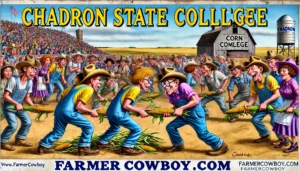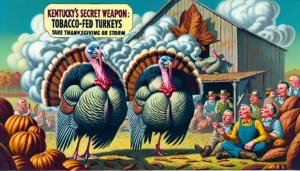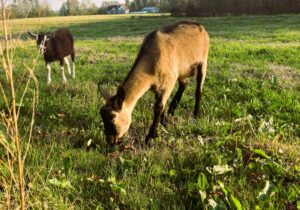Texas Farmers Bet on the Farm Bill: Will Congress Deliver Before Their Grandkids Are Old Enough to Vote?
With Congress dragging its boots on the farm bill, Texas farmers have started wagering on whether they’ll see legislation before they’re betting on Social Security checks.
Stephenville, Texas — a place where patience is as rare as rain and farm bills.
There’s a growing trend among Texas farmers, but it has nothing to do with crop rotation or cattle ranching. No, the latest gamble in the Lone Star State is whether or not Congress will pass a farm bill before their grandchildren are old enough to vote. With delays dragging on, it’s become less a question of if the bill will pass and more of when—if ever.
Local farmers, already stretched thin by a year of wildfires, drought, and floods, are now facing the real possibility of farming without the safety net of government assistance, which could revert to farm policies from the 1940s if Congress continues to sit on its hands. But, as always, Texas farmers are finding humor in the situation—even as their crops and patience wither.
Farm Bill Roulette
In Lubbock, Texas, a group of farmers has started playing a little game to pass the time while Congress stalls on the farm bill. It’s called “Farm Bill Roulette,” and it’s become the hottest game in town.
“Basically, we bet on which year the farm bill will finally pass,” explained Jake, a cotton farmer. “I’ve got my money on 2027, but Bill over there thinks it’ll happen before Christmas. He’s an optimist.”
Local betting pools have been popping up at feed stores and barbecues across the state. Some farmers are even considering opening a Farm Bill casino—after all, it’s not like they have crops to tend to while they wait for Congress to get its act together.
Grandkids First, Farm Bill Later
For many Texas farmers, the delays have gone on for so long that they’re now predicting the farm bill will pass sometime around the same time their grandkids graduate college. Hank, a wheat farmer near Amarillo, recently quipped, “At this rate, my grandkids will be the ones filing for crop insurance—assuming Congress doesn’t make them fill out the forms in cursive.”
Even local politicians have taken note of the humor circulating in the agricultural community. “I get it, they’re frustrated,” said Congressman Ronny Jackson. “But hey, if we don’t pass this farm bill soon, their grandkids might be the ones to do it for them.”
Waiting Longer Than a Drought
Droughts in Texas are notoriously long, but even by those standards, the wait for a new farm bill feels eternal. Texas farmers have started to joke that they’ll see rain in July before they see a new bill passed.
“I’ve been farming through three droughts,” said Jerry, a rancher from Stephenville. “But this farm bill is taking longer to show up than any storm I’ve ever seen.”
Hope Springs Eternal, But Crops Don’t
Farmers are known for their resilience, but even they are starting to lose hope that Congress will ever get its act together. “We can’t run our farms on hope,” said Maria, a rancher from the Texas Panhandle. “Crops don’t grow because you ‘hope’ they will. If Congress doesn’t pass this bill soon, hope is the only thing we’ll be harvesting.”
The irony of it all is that the farm bill is supposed to help the very farmers Congress claims to support. Yet, as deadlines come and go, it feels more like a cruel joke than a lifeline.
Filibuster or Fertilizer?
One of the more popular theories circulating in farming circles is that Congress is secretly using the filibuster as a form of fertilizer. “It’s like they’re just spreading more manure over everything,” said Hank, a West Texas cattle rancher. “But at least manure helps crops grow. The farm bill delays? Not so much.”
Farmers have started joking that if Congress talked any longer, they’d have enough hot air to warm the winter wheat fields. “If only we could turn speeches into subsidies,” said one farmer. “Then we’d be rich.”
Crop Rotation or Congressional Rotation?
As Congress continues to rotate through debates on everything but the farm bill, farmers are beginning to wonder if they’ve rotated their crops more frequently than the government has rotated committee members.
“I’ve changed crops three times since the last farm bill was passed,” said Sarah, a corn farmer near San Angelo. “And every time, I think, ‘Maybe this’ll be the year Congress gets it done.’ Spoiler alert: it’s not.”
Farmers are masters of adapting to changing conditions, but adapting to Congress’s timeline is proving to be an impossible task.
Moo-ving Slowly
Texas ranchers are known for their patience when it comes to cattle, but even they are starting to wonder if Congress is secretly run by cows. “They’re moo-ving slower than any herd I’ve ever seen,” said Bobby, a cattleman from near Abilene. “I mean, come on—how long does it take to pass a farm bill?”
Ranchers across Texas are joking that they’ve seen stampedes with a better sense of urgency than Congress. “At least when cattle move slowly, you can get behind them with a prod,” said Bobby. “With Congress, all you can do is watch.”
Pigs Fly Before Farm Bills Pass
Out in West Texas, where the wind blows fierce and the pigs stay firmly grounded, ranchers have started to joke that they’ll see pigs fly before Congress passes a farm bill.
“I told my wife that the day Congress gets their act together, I’ll be out there in the barn watching pigs sprout wings,” said Fred, a pig farmer. “I’m not holding my breath.”
The phrase has become a common refrain at local co-ops and rodeos. “Pigs’ll fly before that bill gets passed,” one farmer was overheard saying at a stock show. “And even then, I’m not sure Congress will notice.”
Stop Kicking the (Soy) Can
As Congress continues to delay the farm bill, farmers have started to refer to the situation as “kicking the soy can down the road.” The joke, of course, is that soybeans don’t grow in cans—and neither do farm bills.
“Every time we think they’re getting close to passing it, they just push it back again,” lamented Sarah, a soybean farmer from Texas. “At this point, I’m starting to think the only thing Congress knows how to grow is frustration.”
The metaphorical soy can has become a running joke at farm equipment auctions and community BBQs, where frustrated farmers gather to trade stories about their crops—and Congress’s latest delay.
Livestock Has a Better Sense of Urgency
Texas ranchers are no strangers to slow-moving cattle, but even they are starting to wonder if Congress could learn a thing or two from a herd of cows. “My cattle might be slow, but at least they eventually get to the watering hole,” said Joe, a rancher from Amarillo. “Congress? They’re still trying to figure out where the watering hole is.”
Farmers are now using their livestock as an unlikely benchmark for efficiency. “If only Congress moved like a stampeding herd instead of grazing cows,” joked one rancher. “Then maybe we’d have a farm bill by now.”
More Negotiations Than a Cattle Auction
If you’ve ever been to a cattle auction, you know there’s a lot of haggling. But as Texas farmers are starting to point out, even the longest cattle auction doesn’t drag on like the debates over the farm bill.
“I’ve spent less time negotiating at auctions than these guys have spent arguing over a bill that’s supposed to help us,” said Mike, a cattle rancher. “At least when I leave an auction, I have a cow. What do we get out of Congress? More delays.”
Farmers are beginning to wonder if they should send a few auctioneers to Washington, D.C., to speed things up.
Feeding the Economy… Eventually
While farmers wait on the farm bill, they can’t help but point out the irony that they’re supposed to be feeding the economy—but can’t do much without a little help from the government. “We’re supposed to be the backbone of the economy,” said Maria, a wheat farmer. “But I guess Congress forgot that spines need support.”
Farmers across the state are starting to wonder how they’re supposed to keep their operations running without the promised subsidies and protections. “We’re feeding everyone else,” said Maria. “But who’s feeding us?”
Longer Than Winter Wheat
Winter wheat is known for taking its sweet time to grow, but even it has nothing on the pace of Congress. “I’ve planted and harvested winter wheat faster than Congress has moved on this bill,” said Sarah, a farmer from West Texas. “And winter wheat isn’t exactly a speed demon.”
Farmers are now using winter wheat as a new unit of measurement to track the glacial pace of Washington lawmakers. “If Congress worked at the pace of winter wheat,” joked one rancher, “we’d still be waiting on legislation from the 1800s.”
Congress Needs a Good Rain Dance
In Texas, when crops need water, farmers do what they call a “rain dance”—a mix of superstition and prayer in hopes of summoning much-needed rain. Now, as the farm bill languishes, some farmers are suggesting that Congress needs to start doing its own version of a rain dance.
“We do rain dances when we need rain. Maybe Congress needs to do a bill dance,” said Hank, a corn farmer. “Because at this rate, we’ll dry up before they pass anything.”
Is the Farm Bill Just a Crop Circle?
Conspiracy theories about crop circles abound, but Texas farmers are starting to think the farm bill is the biggest mystery of all. “It’s like a crop circle,” said Joe, a rancher. “Everyone talks about it, but no one’s ever actually seen it.”
The joke has spread across farming communities, where farmers compare the elusive farm bill to something out of a sci-fi movie. “I’m starting to think it’s an alien invention,” said one farmer. “Maybe it’ll show up when the UFOs do.”
Solutions-Oriented Strategies for Farmers Facing Congressional Inaction
With Congress slow to act on passing the farm bill, Texas farmers are facing an uncertain landscape. But in true farmer fashion, resilience is key, and there are ways to manage the challenges of operating without immediate government support. Here are some practical, solutions-oriented strategies to help farmers weather the storm while Congress stalls:
1. Diversify Your Crop Rotation to Minimize Risk
In times of uncertainty, crop diversification is essential. Instead of relying solely on subsidies for a single crop, farmers can spread out their risk by rotating high-value crops like corn, soybeans, wheat, and cotton. Crop rotation not only helps reduce financial vulnerability but also enhances soil health and improves long-term sustainability.
Pro Tip: Consult your local agricultural extension office for advice on the best crop rotations for your region’s soil and climate. Look into alternative crops like hemp or specialty vegetables that may offer higher returns in niche markets.
2. Optimize Water Usage and Implement Drought-Resilient Techniques
Given the delays in farm bill support and the constant threat of drought in Texas, now is the perfect time to focus on water conservation. Farmers can adopt water-efficient irrigation systems, such as drip irrigation, and explore technologies like soil moisture sensors to ensure that every drop of water is used wisely.
Practical Advice:
Sign up for local water conservation programs and consider installing rainwater collection systems to capture and store runoff for use during dry periods. If a drought hits before Congress passes the bill, these measures could make a huge difference in your farm’s resilience.
3. Explore Private Financing Options for Short-Term Cash Flow
With the uncertainty surrounding subsidies and government-backed loans, farmers should explore private lending options to maintain cash flow during the growing season. Many financial institutions offer agricultural loans tailored to the specific needs of farmers, especially for purchasing equipment, seeds, or livestock.
Expert Insights:
Be sure to shop around for the best loan terms and interest rates. Keep detailed financial records of your farm’s operations, as these will be crucial in securing favorable loan conditions from private lenders. Consider joining a co-op or forming a group with other local farmers to gain access to better loan rates or bulk purchasing discounts.
4. Leverage Technology to Boost Farm Efficiency
When government assistance is uncertain, using technology to streamline farm operations can save time and money. From automated farm management software to precision agriculture tools, technology can help optimize planting schedules, monitor crop health, and reduce labor costs.
Insider Knowledge:
Invest in drones or GPS-guided equipment to monitor your fields and make data-driven decisions about planting, harvesting, and fertilization. This will allow you to maximize yields even when financial assistance from Congress is delayed.
5. Collaborate with Local Farmers and Build a Support Network
The farming community is famously resilient, and now is the time to lean on that strength. Join local or regional farmer networks where you can share resources, exchange equipment, and collaborate on purchasing inputs in bulk to save money. Working together can help cushion the financial blow of waiting for government relief.
Resourceful Content:
Forming or joining a cooperative can provide additional bargaining power when negotiating prices for seeds, equipment, or even livestock. In times like these, pooling resources is more critical than ever.
6. Adapt Livestock Management Practices for Maximum Efficiency
For ranchers, optimizing feed and grazing schedules can make all the difference when government funding is in limbo. Focus on rotational grazing practices that allow fields to recover and boost overall pasture productivity. Reducing feed costs by growing your own hay or investing in high-efficiency feeding systems can help save on expenses while waiting for subsidies.
Best Practices:
Explore regenerative grazing practices that improve soil health, reduce costs, and provide long-term benefits for your livestock and land. Keeping detailed records of livestock health and feed consumption will also prepare you for applying for any emergency relief that might eventually come from Congress.
7. Prepare for Long-Term Resilience: Reduce Dependency on Government Support
While the farm bill has traditionally provided much-needed support, now may be the time to explore alternative revenue streams that reduce dependence on government programs. Farmers can explore agritourism, organic certifications, or direct-to-consumer sales (such as farmers’ markets and online platforms) to diversify income.
Actionable Recommendations:
Consider setting up an online shop to sell produce, meats, or dairy products directly to consumers. Offering farm experiences or agritourism events can also create an additional income stream that doesn’t rely on federal aid. Many successful farmers have branched out into farm stays, on-site workshops, or hosting seasonal events like pumpkin patches.
Final Thought: Don’t Wait—Innovate
Congress may be slow to act, but that doesn’t mean your farm has to slow down. By embracing these strategies, Texas farmers can keep their operations running smoothly, no matter what Washington is doing. And who knows? By the time the next farm bill passes, you might not even need it.
Disclaimer
This article was painstakingly created with the input of countless Texan farmers who are tired of waiting for Congress—but still have enough humor to laugh about it. No crops were harmed in the making of this article, though several cows were slightly offended by the comparison to Congress. Any resemblance to actual Congress members dragging their feet is purely coincidental, though let’s be real, it probably isn’t.
15 Humorous Observations on the Farm Bill Delays
- “Farm Bill Roulette”
Texas farmers are betting on the farm bill’s passing like it’s a game of roulette—except the wheel never seems to stop spinning. - “Grandkids First, Farm Bill Later”
Farmers joke that their grandkids might graduate college before Congress figures out how to pass a simple piece of legislation. - “Waiting Longer Than a Drought”
Texas farmers say they’ve seen droughts end faster than they’ve seen Congress agree on anything related to agriculture. - “Hope Springs Eternal, But Crops Don’t”
You can almost hear the corn whispering, “Will we get any funding before the next election cycle?” - “Filibuster or Fertilizer?”
Some farmers are starting to wonder if Congress is using the filibuster to fertilize their crops, given how long they’ve been waiting. - “Crop Rotation or Congressional Rotation?”
With farm bill delays, farmers have rotated crops more often than Congress has rotated members of its agriculture committee. - “Moo-ving Slowly”
Farmers are now wondering if Congress is secretly run by cattle, given how slowly things are moo-ving along. - “Pigs Fly Before Farm Bills Pass”
One farmer quipped, “I’ll believe the farm bill is passing the day I see a pig fly—or at least a government official visit my ranch.” - “Stop Kicking the (Soy) Can”
“Congress keeps kicking the can down the road,” said one farmer. “At this point, I’m starting to think it’s a can of soybeans.” - “Livestock Has a Better Sense of Urgency”
“I’ve seen cattle stampede faster than Congress can pass a farm bill,” said one West Texas rancher. - “More Negotiations Than a Cattle Auction”
“I’ve spent less time haggling at a cattle auction than these folks spend negotiating a farm bill,” said a frustrated farmer. - “Feeding the Economy… Eventually”
With Congress dragging its boots, farmers are left wondering, “Who’s feeding the economy while we wait?” - “Longer Than Winter Wheat”
“I’ve watched winter wheat grow faster than this bill is moving,” said a farmer in Amarillo. “And that’s saying something.” - “Congress Needs a Good Rain Dance”
“We do rain dances to end droughts. Congress needs to do a rain dance to get this bill through before we all dry up.” - “Is the Farm Bill Just a Crop Circle?”
“I’m starting to think the farm bill is like a crop circle—everyone talks about it, but no one’s ever really seen it.”
Originally Published at FarmerCowboy.com
2024-10-02 09:37:53
Karl Hoffman is a distinguished agriculturalist with over four decades of experience in sustainable farming practices. He holds a Ph.D. in Agronomy from Cornell University and has made significant contributions as a professor at Iowa State University. Hoffman’s groundbreaking research on integrated pest management and soil health has revolutionized modern agriculture. As a respected farm journalist, his column “Field Notes with Karl Hoffman” and his blog “The Modern Farmer” provide insightful, practical advice to a global audience. Hoffman’s work with the USDA and the United Nations FAO has enhanced food security worldwide. His awards include the USDA’s Distinguished Service Award and the World Food Prize, reflecting his profound impact on agriculture and sustainability.






